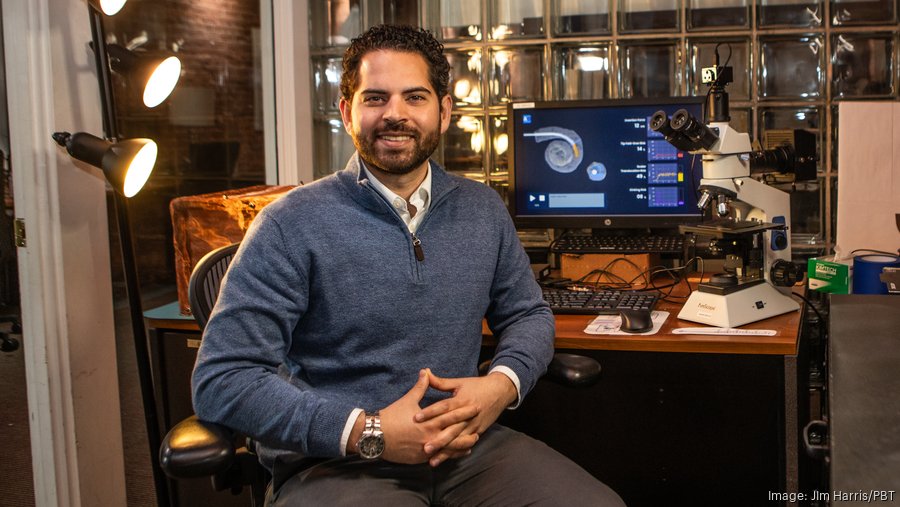Listen to this article 3 min
Jay Reddy is a California native who came to Pittsburgh to attend Carnegie Mellon University for graduate school, and he’s stuck around to co-found and run Advanced Optronics Inc., a Pittsburgh-based biotech company that uses sensor technology and flexible materials to help surgeons do their jobs better. Advanced Optronics, whose first clinical application of its technology is for cochlear implantations to address hearing loss, and CMU recently won $650,000 from the National Science Foundation to help scale the technology and explore other applications.
What is Advanced Optronics in a nutshell?
We’re a surgical technology company. We developed sensor systems that will help guide surgeons to perform less traumatic surgery. The way we do that is using a sensor technology developed by the co-founders at Carnegie Mellon University. We use the same types of fabrication techniques that people use to make computer chips. But they are flexible, biocompatible polymers, which opens a lot of exciting applications inside the body.
How did you come up with this kind of material?
My former research, when I was a Ph.D. student at CMU, was to develop what are called brain computer interfaces. These are implantable devices meant to be put in the brain either for clinical applications like deep brain stimulation or for research applications. It’s critical to be able to understand the electrical activity in neurons, but to be as minimally traumatic as possible. You want to make these devices super tiny, super soft, so they don’t aggravate the brain tissue and cause any damage. We developed techniques doing that, trying to make them as minimally invasive as possible that ultimately we thought could be translated into other types of surgical tools.
Is that the same kind of brain computer interfaces that people like Elon Musk are working on?
The fabrication techniques are similar to the types of techniques that Elon Musk and others in the field are employing. By using these new microfabrication techniques, you massively increase the density of the circuits and the number of channels in these devices and make them much more sophisticated while keeping them to less than a millimeter thick. Instead of augmenting somebody’s capacity, what you’re trying to do with this is help people, help surgeons restore hearing.
How difficult is it to make these things?
We started everything on the lab scale. This started with me building them by hand in the CMU facilities. We now work with both CMU and University of Pittsburgh to use their micro and nanofabrication facilities. But this is something that’s done on commercial scale.
What will the National Science Foundation grant do?
We’re a very small operation. We have three full-time employees at the company, and, outside of that, we are working collaboratively with many different organizations: CMU, University of Illinois Urbana-Champaign, as well as clinicians at Allegheny Health Network and the Center for Neurosciences in Tucson, Arizona. So we have the commercial, the scientific, academic and the clinical expertise on the team. What this NSF grant is going to allow us to do is to bring all of those people together and look at developing our first application or doing customer discovery and refining our first application, which is cochlear implantation to address hearing loss. The NSF is very interested in platform technologies. They’re interested in exploring what are the other potential applications of this technology that we’ve developed in other surgical areas and industries outside of this initial procedure.
What makes Pittsburgh a great place to start a biotech company?
You have a lot of tremendous access to talent, which I think makes it a great place to build a company. Certainly the investment ecosystem isn’t there like it is elsewhere, but it’s coming along, and there’s a lot of people who are working very hard to make that happen. I think there is something to be said for bringing in outside money, like from Boston or the Bay Area. But in terms of doing what you need to do to build a business, building and finding the right team, having the resources, there’s a lot of convergent things happening in Pittsburgh from these different organizations to support that.
What do you do when you’re not building nano devices and trying to grow a company?
I have a pretty eclectic set of hobbies, from gardening to making my own homemade kombucha to different cooking experiments. With those, like nanofabrication, you need attention to detail. You need to be able to stick to developing recipes and stick to a process and have a tremendous amount of patience. If you rush any step, then you might end up setting it back.
That’s fascinating. What’s the secret to kombucha?
Well, no real secret. It’s a fermented tea drink. It’s this vinegary kind of lightly sparkling drink. I really like the sour vinegary taste of it once it gets further along in the process, so you can get different herbs and teas and fruit additives that you put in. You ferment it for a little while and you can try all different sorts of different combinations of how much sugar you have, the time that you leave it for. I have this whole recipe book of all the different things that I’ve tried, and I actually have several recipe books of different additives of … ginger or basil or strawberry, things that you can add into it to try to make different flavors.
ABOUT JAY REDDY:
Title: Co-founder and CEO, Advanced Optronics Inc.
Age: 30
Education: B.S. electrical engineering and computer science, B.S. engineering mathematics and statistics, University of California, Berkeley; M.S. and Ph.D., electrical and computer engineering, Carnegie Mellon University
Residence: Shadyside
Family: Parents and brother
Hobbies: Cooking, gardening, biking and hiking
Causes: Encouraging diversity and inclusion in STEM and the Pittsburgh startup ecosystem
